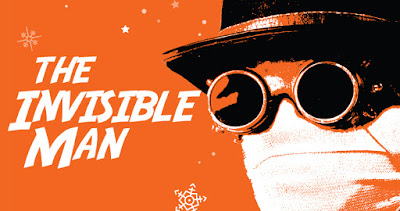Alt-science fiction writer, Christopher Priest once wrote
a novel called The Glamour which argued a perfectly logical basis for
invisibility: that person that never gets served at the bar, the ones you bump into
in the street… some people just have less noticeability than others and the
logical conclusion is that some people you just would never be able to see. Priest
is a huge fan of HG Wells and Derek Webb’s adaptation of The Invisible Man
would no doubt find his favour as whilst, like Wells, he entertains and
educates through counter-factuality as well as the glamourous force of his staging.
Webb is clearly in love with his source material and this
is The Invisible Man as written by the ghost of Ray Cooney after a drunken
dinner party at Vic and Bob’s in which they contacted the ghost of Will Hay and
Moore Marriott. You want proof? Well, the theme from Oh Mr Porter was
played at the beginning and end of the play! I rest my case.
This Invisible Man – let’s call him TIM – races
by at breakneck speed and shows how three can become fifteen as our three
intrepid performers take on many roles with uncanny poise and alacrity. Director
Kate Bannister takes so many risks but it all works seamlessly and hilariously –
hand on heart, I don’t think I’ve laughed this much in a theatre all year.
 |
| Mr Parker being positively protean! All photos Davor@The Ocular Creative |
 |
| "You ain't seen me right?" Shaun Chambers |
 |
| Scott Oswald finds his Marriott |
He ends up seeking out a fellow scientist, Dr Kemp (Mr Parker again) and attempts to force him into helping him… The play picks up pace as the character changes happen so fast, you’d swear there were at least four actors on stage at any one time in the breathless conclusion.
Kate Bannister fits a huge story into the play and
manages the balance between music hall fun and trace elements of the original
more serious intent. Webb also deserves much credit for bringing out comic
flavours that don’t detract from the adventure.
The three actors work superbly as a team and tackle so much
variety – what a challenge for Matthew Parker’s first acting gig after over a
decade as a director? They all pass with flying colours.
IThankYouTheatre rating: **** The
perfect Christmas fare from the Jack Brockley Theatre directed and played at
speed by an energised trio-troop who fill out every part with comic conviction.
The spirits of Hay and Marriott walked amongst us tonight but, as with the main
character, we could only feel them, not see them.
Props to William Ingham’s lighting design, especially
innovative for the denouement… Karl Swinyard’s design is also a wonder transporting
us back over a century and at least 50 miles south geographically.
The Invisible Man plays at the Jack until 4th
January – see it if you can, there may be returns if you’re very lucky!









































